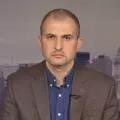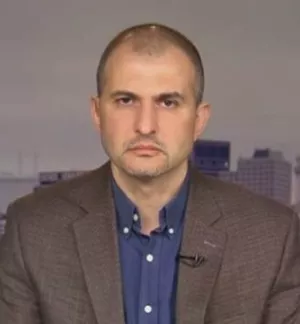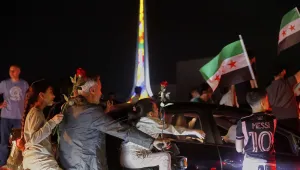In 2008, Kiev was actively pushing to integrate Ukraine into the West not only economically and politically, but also militarily. And yet Russia didn't intervene. So what's changed between now and then?
The Ukraine crisis is still raging, but it's important to look back at events in recent years to try to understand why President Vladimir Putin sprang into action, first by taking Crimea and then by imposing a difficult choice on the interim government in Kiev: Either forswear membership in any Western military alliance and accept the federalization of Ukraine or risk losing more land.
One obvious explanation is that Putin's hand was forced by the ascent of radical nationalist elements to power in Kiev after the collapse of the February 21 deal between Ukraine's opposition and then president Viktor Yanukovych.
Prior to that deal, Putin had strong hopes that it would be either the incumbent head of the Ukrainian state or its former premier Yulia Tymoshenko - whose release from prison was being negotiated at that time - who would win the early presidential elections that were stipulated by the February 21 agreement. Putin knew that both of the two contenders well and was confident that neither of them would antagonize Russia.
But when the radical wing of the Ukrainian opposition refused to accept the February 21 deal and forced Yanukovych to flee, Putin had to act as he became seriously concerned that Russia would 'lose' Ukraine. After all, the Ukrainian radicals made no secret of their aversion to cooperation with Russia or their belief that Ukraine should pursue integration with the West.
But, if this explanation is true, then why didn't Putin intervene back in the second half of the 2000s when Ukraine's president Viktor Yushchenko was actively pushing for Ukraine's membership in NATO, eventually winning a promise of membership in this alliance? In contrast to Yushchenko, the current interim government in Kiev has repeatedly denied having any ambition to seek NATO membership for Ukraine.
Now, it is true that the association agreement with the European Union, the signing of which has always been one of the prime goals of the anti-Yanukovych coalition, provides for military cooperation between Ukraine in the framework of the EU's Common Security and Defence Policy (CSDP). But you still won't hear the Russian president refer to the fledgling CSDP as a threat.
In contrast, Putin has issued plenty of unambiguous warnings that expansion of NATO to the post-Soviet republics (with the exception of the Baltics) would amount to the crossing of a Russian red line.
For instance, Putin asserted in April 2008: "The presence of a powerful military bloc on our borders, whose members are guided by Article 5 of the Washington Treaty, will be seen as a direct threat to our national security."
And, yet the Russian leadership didn't intervene, even though Ukraine's then president Yushchenko was campaigning for NATO membership, ignoring warnings from Russia and results of opinion polls in his own country, which show eastern and southeastern Ukraine oppose such membership.
U.S. president George W. Bush lobbied hard for both Ukraine and Georgia to be given membership action plans at the 2008 summit in Bucharest, but Germany's Angel Merkel dug in her heels. Nevertheless, the April 2008 summit did promise to both Ukraine and Georgia that they would be in NATO one day.
Why didn't Moscow intervene back in 2008?
There are multiple reasons that explain why Putin didn't intervene in 2008.
Most important, Ukraine had a legitimate, functioning president and government in 2008. This meant the central authorities could not have been dismissed as illegitimate and that Kiev could organize a better response if Ukraine's neighbors interfered in any of its provinces.
And, while Yushchenko was even more disinclined to honor Russia's wishes for protection of the Russian language in Ukraine than the current interim government, the streets of Ukrainian cities were more or less orderly during his rule. There were no violent clashes between pro-Western and pro-Russian activists that we have seen in Ukraine this year, and that Russian leaders described as a major threat to Ukraine's ethnic Russians, claiming Russia's responsibility to protect compatriots.
Nor was the power in the Ukrainian government and parliament so skewed with a third of the government's ministers and above hailing from Lviv and with only two members of the new government representing south and east, according to Foreign Affairs' recent analysis of disparities in the former Soviet republic.
Putin might have also thought at that time that Georgia's NATO ambitions represented a greater threat, especially as tensions escalated over South Ossetia and Abkhazia throughout the spring and summer of 2008, ultimately culminating in a war in August of that year.
The Western countries' efforts to punish Russia after August 2008 were half-hearted and short-lived. Had, however, Russia intervened militarily both in Georgia and Ukraine in the course of the same year, then Western countries would have been more likely to impose longer-term and more painful sanctions on Moscow.
Also, in spring 2008, Moscow might still have nurtured hopes that its European Security Treaty proposal, which would have essentially given Russia a right of veto in (what else) the continent's collective security issues, might end up being accepted. That draft treaty got eventually rejected, but, as time went by, Ukraine 'uncrossed' the red line.
Having beaten Yushchenko in the 2010 elections, Yanukovych took pains to accommodate Russia's concerns, announcing that Ukraine would not seek membership in NATO and extending the stay of Russia's Black Sea fleet in the Crimea for several decades. And last fall saw Yanukovych agree to suspend signing of the association and free trade deals with EU and began to make overtures to the Russian-led Customs Union.
What has changed since 2008?
All that changed when the militants, representing the nationalist wing of the opposition, forced Yanukovych out. Putin became increasingly concerned that the victorious nationalists would eventually win the ensuing battle for power among the factions of the opposition coalition and proceed to anchor Ukraine to the Western world, whose leader seemed oblivious to any crossing of the red line.
Indeed, if U.S. Assistant Secretary of State Victoria Nuland's alleged "F***k the EU" comment indicates that the United States was prepared to ignore the European Union's position as Washington contemplated how to influence the formation of a new Ukrainian government, then one can deduce how much some of the U.S. government officials were willing to accommodate Russia's interests in Ukraine.
And this time around, conditions were much more conducive for enforcing Russia's red line in Ukraine than they were when this line was almost crossed by Yushchenko in 2008.
The interim government - formed by the victorious opposition and featuring a strong representation of nationalists - proved to be unable to fully control the situation in the eastern provinces, where anti-Russian and pro-Russian activists clashed violently and repeatedly. A subsequent by the U.N. human rights office found that "although there were some attacks against the ethnic Russian community, these were neither systematic nor widespread."
But Russian leadership insisted that the threat was real and intervened in a way that both signaled to Kiev that Ukraine would lose more land if the national government tilts toward the West and allowed Putin to score big points at home, pushing his popularity to 80 percent.
Some pundits also assert that Putin might have believed that incumbent U.S. President Barack Obama is weaker than former President Bush who they believe would have responded in a more forceful way to Russia's intervention in Ukraine. My response to such assertions is that Putin was not particularly impressed by the Bush Administration's reaction to the August 2008 war either.
When the red line gets real
State leaders are often non-committal when introducing red lines. They prefer to maintain a certain air of ambiguity so as to be able to backtrack without losing face.
However, the red line becomes real once (and if) a leader becomes confident that he can enforce it in a way that would generate more benefits than costs. In such a situation, the leader could be expected to first signal his preparedness to retaliate for crossing of that line by issuing tougher-worded warnings as well as through diplomatic and quasi-diplomatic moves.
The trouble is, of course, that this leader's counterparts might dismiss these moves as bluffing without realizing that the red line just got real. This is what happened in Kiev when the then-opposition heard Putin's advisor Sergei Glazyev warn in late 2013 and early 2014 that Russia could intervene.
Also, Yushchenko's success in securing a promise of NATO membership without intervention from Russia must have convinced Ukraine's opposition and their Western partners that Putin's red line in Ukraine was not quite real and they could make another incremental move toward integration of Ukraine into the West.
But if you cannot gauge how your powerful neighbor - that you know to have enormous leverage against your country - would react to your moves and hedge accordingly, then, maybe, you should not get into the business of running a nation-state in the first place.
Leaders of the interim government in Kiev should finally start exercising some badly needed foresight or they will risk losing de facto control over parts of eastern Ukraine. Western countries would, of course, condemn such a loss would as violation of international law and impose sanctions. But by now Kiev probably knows neither the United States nor its allies would enter a military conflict with Russian forces to restore Ukraine's territorial integrity.
Taking and holding a high moral ground in international affairs is important, but not as important as holding one's ground literally and that requires knowledge of others' redlines and what crossing of such redlines would entail.
Full text available here:
http://www.russia-direct.org/content/how-russias-red-line-ukraine-got-real
Saradzhyan, Simon. “How Russia's Red Line in Ukraine Got Real.” Russia Direct, April 16, 2014



